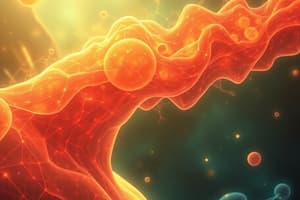Podcast
Questions and Answers
What is a common symptom of hypothyroidism?
What is a common symptom of hypothyroidism?
- Weight loss
- Rapid heartbeat
- Heat intolerance
- Cold intolerance (correct)
Which of the following is a common cause of hyperthyroidism?
Which of the following is a common cause of hyperthyroidism?
- Graves' disease (correct)
- Thyroidectomy
- Hashimoto's thyroiditis
- Iodine deficiency
What hormone is produced by the pituitary gland to regulate thyroid hormone production?
What hormone is produced by the pituitary gland to regulate thyroid hormone production?
- Thyrotropin-Releasing Hormone (TRH)
- Triiodothyronine (T3)
- Thyroid-Stimulating Hormone (TSH) (correct)
- Thyroxine (T4)
What test is considered the first-line diagnostic test for thyroid function?
What test is considered the first-line diagnostic test for thyroid function?
Which treatment is commonly prescribed for hypothyroidism?
Which treatment is commonly prescribed for hypothyroidism?
What is a potential complication associated with thyroid nodules?
What is a potential complication associated with thyroid nodules?
The thyroid hormone regulation feedback loop primarily involves which hormone released by the hypothalamus?
The thyroid hormone regulation feedback loop primarily involves which hormone released by the hypothalamus?
Which treatment option might be necessary for severe hyperthyroidism?
Which treatment option might be necessary for severe hyperthyroidism?
Flashcards are hidden until you start studying
Study Notes
Thyroid Disorders
-
Hypothyroidism:
- Underactive thyroid; insufficient hormone production.
- Symptoms: fatigue, weight gain, cold intolerance, depression.
- Common causes: Hashimoto's thyroiditis, iodine deficiency, thyroidectomy.
-
Hyperthyroidism:
- Overactive thyroid; excessive hormone production.
- Symptoms: weight loss, heat intolerance, anxiety, rapid heartbeat.
- Common causes: Graves' disease, thyroid nodules, excessive iodine intake.
-
Goiter:
- Enlargement of the thyroid gland.
- Can occur in both hypothyroidism and hyperthyroidism.
- Often caused by iodine deficiency or autoimmune diseases.
-
Thyroid Nodules:
- Lumps in the thyroid; can be benign or malignant.
- Risk factors include age, gender, and family history.
-
Thyroid Cancer:
- Types include papillary, follicular, medullary, and anaplastic.
- Risk factors: previous radiation exposure, family history.
Hormone Regulation
-
Thyroid Hormones:
- T3 (triiodothyronine) and T4 (thyroxine) are the primary hormones.
- Regulate metabolism, growth, and development.
-
Thyroid-Stimulating Hormone (TSH):
- Produced by the pituitary gland.
- Stimulates the thyroid to produce T3 and T4.
-
Regulation Mechanism:
- Hypothalamus releases Thyrotropin-Releasing Hormone (TRH).
- TRH stimulates pituitary to release TSH.
- TSH stimulates thyroid hormone production; feedback loop maintains balance.
Diagnostic Tests
-
TSH Test:
- First-line test for thyroid function.
- High TSH indicates hypothyroidism; low TSH indicates hyperthyroidism.
-
Free T4 and T3 Tests:
- Measure levels of unbound thyroid hormones in the blood.
- Helps confirm hypothyroidism or hyperthyroidism.
-
Thyroid Antibodies Test:
- Identifies autoimmune thyroid disorders (e.g., Hashimoto's, Graves').
- Common antibodies: TPO antibodies, TSI.
-
Imaging Tests:
- Ultrasound: evaluates nodules; assesses goiter size.
- Radioactive iodine uptake test: measures thyroid's ability to absorb iodine.
Treatment Options
-
Hypothyroidism Treatment:
- Levothyroxine (synthetic T4) replacement therapy.
- Dosage individualized; regular monitoring of TSH levels required.
-
Hyperthyroidism Treatment:
- Antithyroid medications (e.g., methimazole, propylthiouracil).
- Radioactive iodine therapy: destroys overactive thyroid cells.
- Surgery (thyroidectomy) may be necessary in severe cases.
-
Goiter Treatment:
- Depends on cause; may include iodine supplementation or surgery.
-
Thyroid Cancer Treatment:
- Surgery is the primary treatment; may require radioactive iodine or thyroid hormone replacement post-surgery.
- Follow-up care important for monitoring recurrence.
Thyroid Disorders
- Hypothyroidism is characterized by an underactive thyroid that produces insufficient hormones, leading to symptoms like fatigue, weight gain, cold intolerance, and depression.
- Common causes of hypothyroidism include Hashimoto's thyroiditis, iodine deficiency, and thyroidectomy.
- Hyperthyroidism arises from an overactive thyroid producing excessive hormones, manifesting as weight loss, heat intolerance, anxiety, and rapid heartbeat.
- Graves' disease, thyroid nodules, and excessive iodine intake are common causes of hyperthyroidism.
- A goiter signifies an enlargement of the thyroid gland, which can occur in both hypothyroidism and hyperthyroidism. It is often due to iodine deficiency or autoimmune diseases.
- Thyroid nodules are lumps that can be benign or malignant, with risk factors including age, gender, and family history.
- Thyroid cancer includes several types: papillary, follicular, medullary, and anaplastic. Key risk factors include previous radiation exposure and family history.
Hormone Regulation
- The primary thyroid hormones are T3 (triiodothyronine) and T4 (thyroxine), essential for regulating metabolism, growth, and development.
- Thyroid-Stimulating Hormone (TSH) is produced by the pituitary gland and stimulates the thyroid to produce T3 and T4.
- The regulation mechanism involves the hypothalamus releasing Thyrotropin-Releasing Hormone (TRH), which prompts the pituitary to release TSH, triggering thyroid hormone production. This feedback loop maintains hormonal balance.
Diagnostic Tests
- The TSH test is the first-line assessment for thyroid function; elevated TSH suggests hypothyroidism, while low TSH indicates hyperthyroidism.
- Free T4 and T3 tests measure levels of unbound thyroid hormones in the blood and help confirm thyroid disorders.
- Thyroid Antibodies Test identifies autoimmune thyroid disorders, with common antibodies including TPO antibodies and TSI.
- Imaging tests such as ultrasound evaluate the presence and size of nodules or goiters, while the radioactive iodine uptake test assesses the thyroid's iodine absorption capability.
Treatment Options
- Levothyroxine, a synthetic form of T4, is the standard treatment for hypothyroidism, with dosage tailored to individual needs and TSH levels monitored regularly.
- Hyperthyroidism treatment options include antithyroid medications (e.g., methimazole, propylthiouracil), radioactive iodine therapy to destroy overactive cells, or surgery if necessary.
- Goiter treatment depends on its cause, potentially involving iodine supplementation or surgical intervention.
- For thyroid cancer, surgery is often the primary treatment, which may be followed by radioactive iodine therapy or hormone replacement, necessitating consistent follow-up care for recurrence monitoring.
Studying That Suits You
Use AI to generate personalized quizzes and flashcards to suit your learning preferences.



